Create OPA policies to stop STO pipelines automatically
You can use Harness Policy as Code to write and enforce policies against your security tests, and to stop your pipelines if a security test has any issues that violate those policies.
You can use Harness Policy as Code to enforce policies such as:
-
A security test cannot include any issues in a list of severities such as Critical or New Critical.
-
A security test cannot include any issues for CVEs past a certain age, for example no critical-severity CVEs more than three years old.
-
A security test cannot include any issues in a list of titles such as
libsqlite3orjavascript.express.security.audit. -
A security test cannot include any more than 75 occurrences of TAR-related issues (issue title matches regex
".*tar.*"). -
A security test cannot include any issues in a list of reference IDs such as CWE-78 or CVE-2023-52138.
Important notes
-
This topic assumes that you have a basic knowledge of the following:
- Governance policies and how to implement them:
- Severity scores and levels in STO
Security Test policy samples
The Harness Policy Library includes the following policy samples that make it easy to create security test policies and enforce them against your scan results.
- Exclude vulnerabilities by severity
- Exclude vulnerabilities by reference ID
- Exclude vulnerabilities by title
- Exclude vulnerabilities by number of occurrences
- Exclude vulnerabilities by CVE age
- Exclude vulnerabilities using STO output variables
Exclude vulnerabilities by severity
Apply a policy to a scan step to warn or block on any vulnerabilities with the specified severity.
You must copy the entire sample code from the OPA policy library, as described in Create a new Security Tests OPA policy.
Here is a sample policy that you can evaluate using the On Step event for a scan step.
This policy sample supports the following vulnerabilities only: Critical, High, Medium, Low, and Info. To create policies based on output variables such as NEW_CRITICAL, go to Exclude vulnerabilities using STO output variables.
package securityTests
import future.keywords.in
import future.keywords.if
# Define a set of severities that are denied (Critical, High, Medium, Low, Info)
# The following example denies if the scan results include any issue with a severity of Critical or High.
deny_list := fill_defaults([
{
"severity": {"value": "Critical", "operator": "=="}
},
{
"severity": {"value": "High", "operator": "=="}
}
])
Exclude vulnerabilities by reference ID
Apply a policy to a scan step to warn or block on any vulnerabilities in a specific list of CVEs or CWEs.
You must copy the entire sample code from the OPA policy library, as described in Create a new Security Tests OPA policy.
Here is a sample policy that you can evaluate using the On Step event for a scan step.
package securityTests
import future.keywords.in
import future.keywords.if
# Define a set of reference-identifiers that are denied
# The following policy denies if the scan results include any occurrence of
# - cwe-772
# - cve-2019-14250
# - CWE-772
# - CVE-2019-14250
deny_list := fill_defaults([
{
"refId": {"value": "772", "operator": "=="},
"refType": {"value": "cwe", "operator": "=="}
},
{
"refId": {"value": "772", "operator": "=="},
"refType": {"value": "CWE", "operator": "=="}
},
{
"refId": {"value": "2019-14250", "operator": "=="},
"refType": {"value": "cve", "operator": "=="}
},
{
"refId": {"value": "2019-14250", "operator": "=="},
"refType": {"value": "CVE", "operator": "=="}
}
])
Exclude vulnerabilities by title
Apply a policy to a scan step to warn or block on any vulnerabilities in a specific list of issue titles.
You must copy the entire sample code from the OPA policy library, as described in Create a new Security Tests OPA policy.
You can use the ~ operator to find titles based on Python regular expressions.
Here is a sample policy that you can evaluate using the On Step event for a scan step.
package securityTests
import future.keywords.in
import future.keywords.if
# Define a set of titles that are denied
# The following example denies if the scan results include any issues related to `tar@1.34` or `libsqlite3`
deny_list := fill_defaults([
{
"title": {"value": "tar@1.34", "operator": "~"}
},
{
"title": {"value": "libsqlite3", "operator": "~"}
}
])
Exclude vulnerabilities by number of occurrences
Apply a policy to a scan step to warn or block vulnerabilities based on a set of titles and the maximum allowed number of occurrences for each vulnerability.
You must copy the entire sample code from the OPA policy library, as described in Create a new Security Tests OPA policy.
You can use the ~ operator to find titles based on Python regular expressions.
Here is a sample policy that you can evaluate using the On Step event for a scan step.
package securityTests
import future.keywords.in
import future.keywords.if
# Define a set of titles and maximum occurrences that are denied
# The following example denies on scan results with more than 25 occurrences of TAR- or cURL-related issues
deny_list := fill_defaults([
{
"title": {"value": ".*tar.*", "operator": "~"},
"maxOccurrences": {"value": 25, "operator": ">="},
},
{
"title": {"value": ".*curl.*", "operator": "~"},
"maxOccurrences": {"value": 25, "operator": ">="},
}
])
Exclude vulnerabilities by CVE age
Apply a policy to a scan step to warn or block vulnerabilities based on CVEs by severity and age.
You must copy the entire sample code from the OPA policy library, as described in Create a new Security Tests OPA policy.
Here is a sample policy that you can evaluate using the On Step event for a scan step.
package securityTests
import future.keywords.in
import future.keywords.if
# Define a set of CVE ages (as old/older than given year) and severities (equal/greater than) that are denied
# This example denies CVEs for any of the following filters:
# - Critical severities, new (2021 or earlier)
# - High severities, old (2018 or earlier)
# - Medium severities, very old (2015 or earlier)
deny_list := fill_defaults([
{
"year": {"value": 2023, "operator": "<="},
"severity": {"value": "Critical", "operator": "=="}
},
{
"year": {"value": 2018, "operator": ">="},
"severity": {"value": "High", "operator": "=="}
},
{
"year": {"value": 214, "operator": "<="},
"severity": {"value": "Medium", "operator": "=="}
}
])
Exclude vulnerabilities using STO output variables
You can create policies based on the output variables generated by an STO scan step.
For example, suppose you want a policy to warn or block if a scan step finds any new vulnerabilities with severities of Critical or High. In this case, you can create a policy with the following OPA code:
package pipeline_environment
# Warn or block if the scan step detects any NEW_CRITICAL or NEW_HIGH vulnerabilities
deny[sprintf("Scan can't contain any NEW_CRITICAL vulnerability '%s'", [input[_].outcome.outputVariables.NEW_CRITICAL])] {
input[_].outcome.outputVariables.NEW_CRITICAL != "0"
}
deny[sprintf("Scan can't contain any high vulnerability '%s'", [input[_].outcome.outputVariables.NEW_HIGH])] {
input[_].outcome.outputVariables.NEW_HIGH != "0"
}
Workflow description
The following steps describes the end-to-end workflow:
-
Create a policy set with the policies you want to enforce.
-
Enforce the policy set in your scan step.
Create a new Security Tests OPA policy
-
You can create policies at the account or the project scope. Go to your account or project, then select Security and Governance > Policies.
-
Select Policies (top right) and then New Policy.
-
Select a Security Tests policy from the Policy samples library.
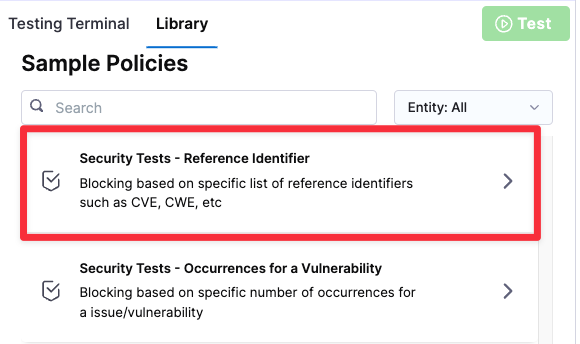
-
Select Use this sample (bottom). This copies the entire policy sample to the edit pane (left).
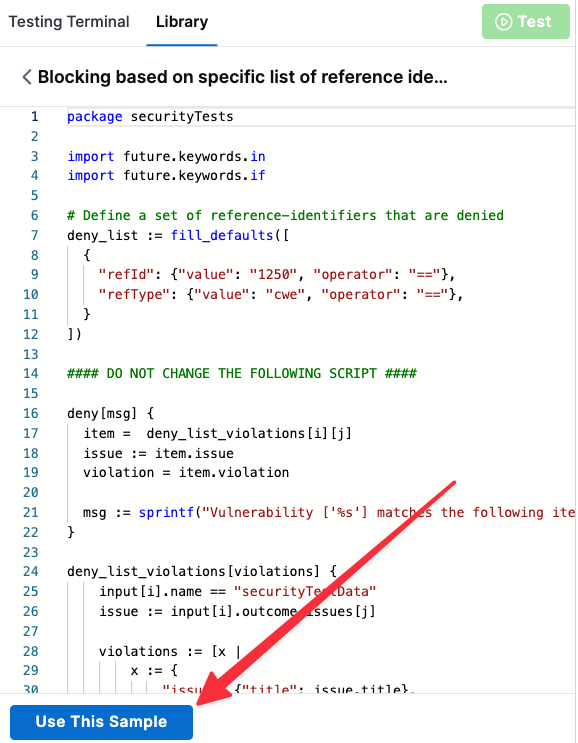
-
Configure the policy as needed. In this example, the policy excludes vulnerabilities with a severity of Critical.
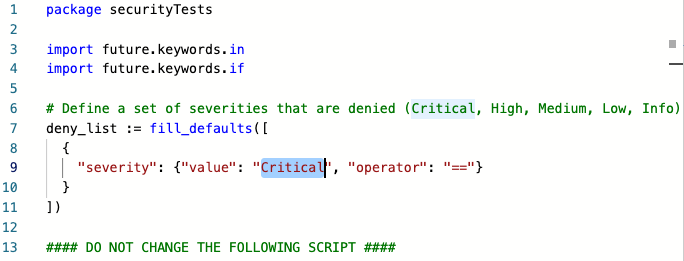
-
Test your policy to verify that it works as intended.
Each policy sample includes a set of test data that you can use. In the Testing Terminal, examine the test data and edit it as needed. Then click Test to verify the results.
It is good practice to test both a Success and Failure case for your policy. The following example illustrates this workflow.
In this example, the policy denies on reference ID CWE-1230. In this case, you would do the following:
-
Search the test results for the string
1230. In this case, the ID is not found.
-
Click Test. The test succeeds.
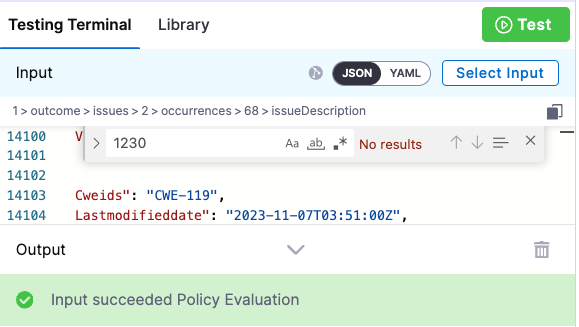
-
Search the test results for the string
cweand edit an entry so it matches the reference ID.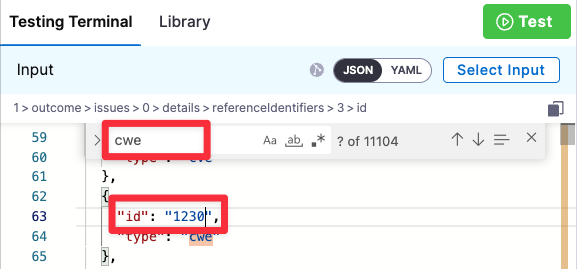
-
Click Test again. The test fails because the data includes the specified CWE.
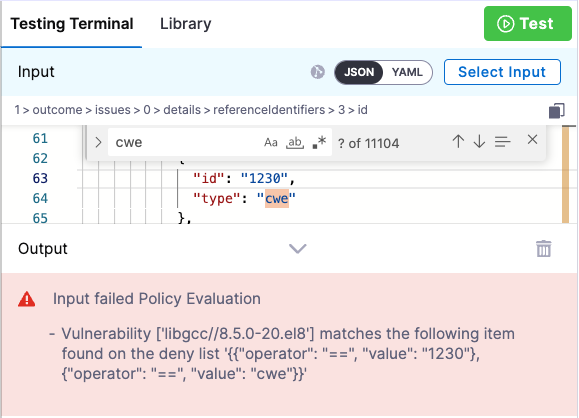
-
-
Once you're satisfied that the policy works as intended, save it.
Create a policy set
A policy set is a collection of one or more policies. You combine policies into a set and then include it in a scan step.
-
Go to Security and Governance > Policies. Then click Policy Sets (top right) and then New Policy Set.
-
Click New Policy Set. The Policy Set wizard appears.
-
Overview:
-
Name — Enter a descriptive name such as myorg/myimage policies.
-
Entity type this policy applies to = Security Tests
-
On what event should the policy be set to = On Step
These settings allow you to apply the member policies to a specific step, which you'll define below.
-
-
Policy evaluation criteria:
-
Click Add Policy.
-
Select the policy you just created and set the pull-down to Error and Exit. This is the action to take if any policies in the set are violated.

-
Click Apply to add the policy to the set, then Finish to close the Policy Set wizard.
-
-
❗ In the Policy Sets page, enable Enforced for your new policy set.

Enforce the policy in your scan step
Now you can set up your scan step to stop builds automatically when the policy gets violated.
-
Go to the scan step and click Advanced.
-
Under Policy Enforcement, click Add/Modify Policy Set and add the policy set you just created.
-
Click Apply Changes and then save the updated pipeline.
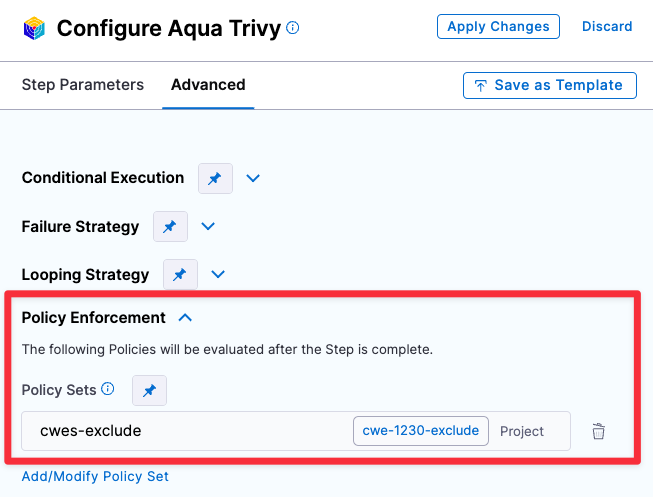
Set up email notifications for pipeline failures
You have a Policy that fails the pipeline based on an OPA policy. Now you can configure the stage to send an email notification automatically whenever the pipeline fails.
-
Click Notifications (right-side menu). The New Notification wizard appears.
-
Set up the notification as follows:
-
Overview page — Enter a notification name such as Pipeline failed -- NEW_CRITICAL or NEW_HIGH issues detected.
-
Pipeline Events page — Select Stage Failed for the event that triggers the notification. Then select the stage that has the Policy step you just created.
-
Notification Method page — Specify Email for the method and specify the recipient emails.
-
YAML pipeline example
The following pipeline that can generate two different notifications. If the code scan detects any CRITICAL or NEW_CRITICAL issues, it sends an automated email like this:
"STO scan of sto-notification-example found the following issues:
Critical : 1
New Critical : 0
High: 0
New High: 0
Medium: 0
New Medium: 0
See https://app.harness.io/ng/#/account/XXXXXXXXXXXXXXXXXXXXXX/sto/orgs/default/"
If the scan finds any NEW_CRITICAL or NEW_HIGH issues, it stops the pipeline execution and sends an email like this:
Stage Block_on_New_Critical_and_New_High_issues failed in pipeline stonotifyexample_-_v3
triggered by D*** B******
Started on Fri Apr 07 14:53:34 GMT 2023 and StageFailed on Fri Apr 07 14:53:36 GMT 2023
Execution URL https://app.harness.io/ng/#/account/XXXXXXXXXXXXXXXXXXXXXX/sto/orgs/default/projects/myProject/pipelines/stonotifyexample_-_v3/executions/XXXXXXXXXXXXXXXXXXXXXX/pipeline
2s
Here's the full pipeline. Note that the policy and policy set are referenced, but not defined, in the pipeline itself.
pipeline:
name: sto-notification-example
identifier: stonotifyexample
projectIdentifier: default
orgIdentifier: default
tags: {}
properties:
ci:
codebase:
connectorRef: YOUR_CODE_REPO_CONNECTOR_ID
build: <+input>
stages:
- stage:
name: banditScanStage
identifier: banditScanStage
description: ""
type: SecurityTests
spec:
cloneCodebase: true
execution:
steps:
- step:
type: Bandit
name: Bandit_1
identifier: Bandit_1
spec:
mode: orchestration
config: default
target:
name: dvpwaScanStep-v3
type: repository
variant: <+codebase.branch>
advanced:
log:
level: info
infrastructure:
type: KubernetesDirect
spec:
connectorRef: YOUR_KUBERNETES_CLUSTER_CONNECTOR_ID
namespace: YOUR_NAMESPACE
automountServiceAccountToken: true
nodeSelector: {}
os: Linux
- stage:
name: Block on New-Critical and New-High issues
identifier: Block_on_New_Critical_and_New_High_issues
description: ""
type: Custom
spec:
execution:
steps:
- step:
type: Email
name: emailOnNotification
identifier: Email_1
spec:
to: john.smithh@myorg.org
cc: ""
subject: "STO ALERT: Critical issues found in <+pipeline.name>"
body: |-
"STO scan of <+pipeline.name> found the following issues: <br>
Critical : <+pipeline.stages.banditScanStage.spec.execution.steps.Bandit_1.output.outputVariables.CRITICAL> <br>
New Critical : <+pipeline.stages.banditScanStage.spec.execution.steps.Bandit_1.output.outputVariables.NEW_CRITICAL> <br>
High: <+pipeline.stages.banditScanStage.spec.execution.steps.Bandit_1.output.outputVariables.HIGH> <br>
New High: <+pipeline.stages.banditScanStage.spec.execution.steps.Bandit_1.output.outputVariables.NEW_HIGH> <br>
Medium: <+pipeline.stages.banditScanStage.spec.execution.steps.Bandit_1.output.outputVariables.MEDIUM> <br>
New Medium: <+pipeline.stages.banditScanStage.spec.execution.steps.Bandit_1.output.outputVariables.NEW_MEDIUM> <br>
See https://app.harness.io/ng/#/account/MY_ACCOUNT_ID/sto/orgs/default/"
timeout: 1d
when:
stageStatus: All
condition: <+pipeline.stages.banditScanStage.spec.execution.steps.Bandit_1.output.outputVariables.NEW_CRITICAL> > 0 || <+pipeline.stages.banditScanStage.spec.execution.steps.Bandit_1.output.outputVariables.CRITICAL> > 0
- step:
type: Policy
name: Policy_1
identifier: Policy_1
spec:
policySets:
- account.Security_Set_Block_on_Issue_Severity
type: Custom
policySpec:
payload: |-
{
"NEW_CRITICAL": <+pipeline.stages.banditScanStage.spec.execution.steps.Bandit_1.output.outputVariables.NEW_CRITICAL>,
"NEW_HIGH": <+pipeline.stages.banditScanStage.spec.execution.steps.Bandit_1.output.outputVariables.NEW_HIGH>
}
timeout: 10m
failureStrategies: []
tags: {}
notificationRules:
- name: example sto test
identifier: example_sto_test
pipelineEvents:
- type: StageFailed
forStages:
- Block_on_Critical_and_High_issues
notificationMethod:
type: Email
spec:
userGroups: []
recipients:
- john.smithh@myorg.org
enabled: true